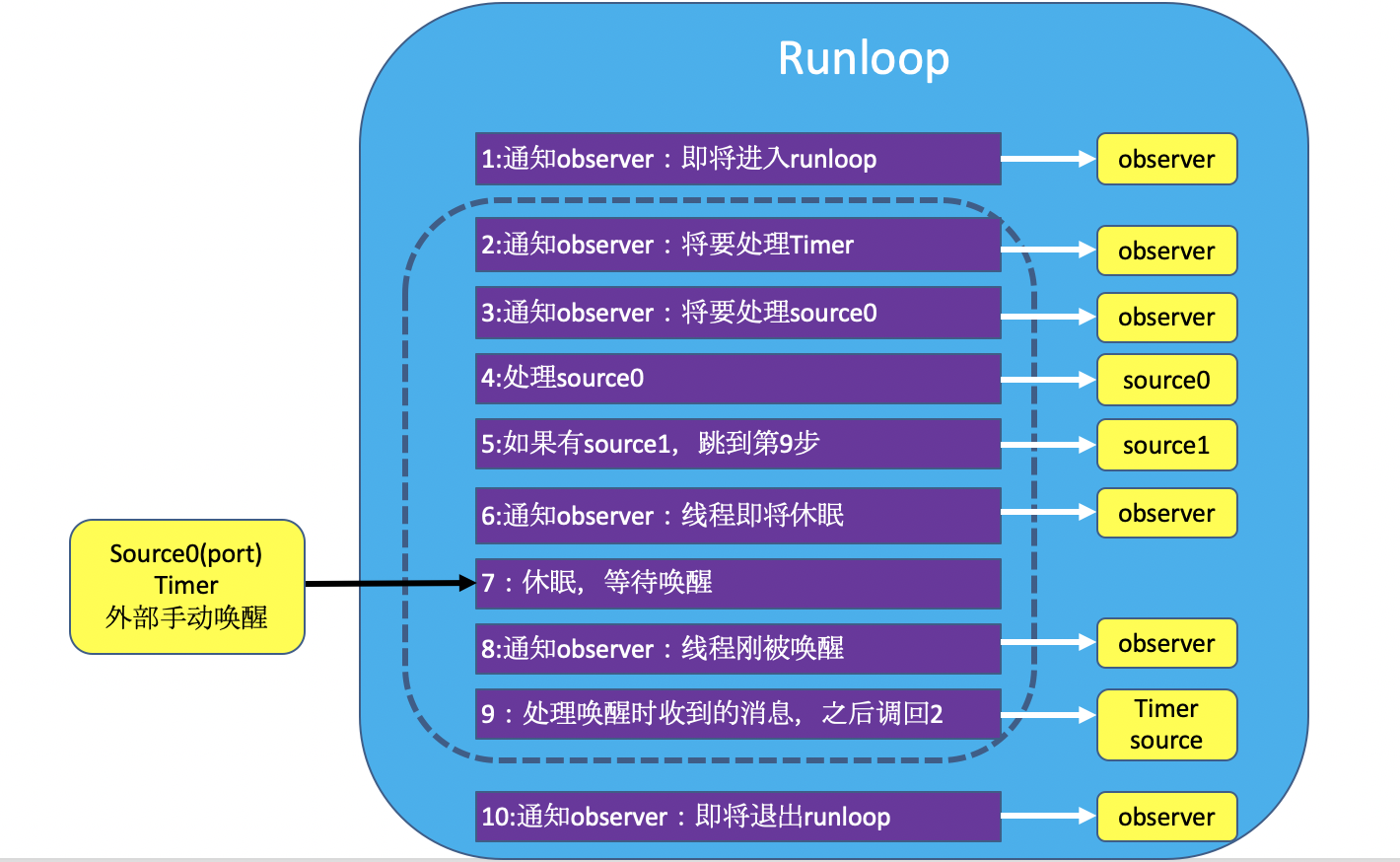方法->底层会编译成消息->消息查找会使用递归查找
元类是一种虚拟的类,系统实现的,用来存储类对象的
对象分为:
1. 实例对象:存在类里面,
2. 类对象:存在元类里面
实例方法:
递归查找父类 -> 最终会查找到NSObject
如果没有实现就会进入动态方法解析
/***********************************************************************
* lookUpImpOrForward.
* The standard IMP lookup.
* initialize==NO tries to avoid +initialize (but sometimes fails)
* cache==NO skips optimistic unlocked lookup (but uses cache elsewhere)
* Most callers should use initialize==YES and cache==YES.
* inst is an instance of cls or a subclass thereof, or nil if none is known.
* If cls is an un-initialized metaclass then a non-nil inst is faster.
* May return _objc_msgForward_impcache. IMPs destined for external use
* must be converted to _objc_msgForward or _objc_msgForward_stret.
* If you don't want forwarding at all, use lookUpImpOrNil() instead.
**********************************************************************/
IMP lookUpImpOrForward(Class cls, SEL sel, id inst,
bool initialize, bool cache, bool resolver)
{
调用方法cls首先进来的是类对象。
IMP imp = nil;
bool triedResolver = NO;
runtimeLock.assertUnlocked();
// Optimistic cache lookup
if (cache) {
imp = cache_getImp(cls, sel);
if (imp) return imp;
}
// runtimeLock is held during isRealized and isInitialized checking
// to prevent races against concurrent realization.
// runtimeLock is held during method search to make
// method-lookup + cache-fill atomic with respect to method addition.
// Otherwise, a category could be added but ignored indefinitely because
// the cache was re-filled with the old value after the cache flush on
// behalf of the category.
runtimeLock.lock();
checkIsKnownClass(cls);
if (!cls->isRealized()) {
realizeClass(cls);
}
if (initialize && !cls->isInitialized()) {
runtimeLock.unlock();
_class_initialize (_class_getNonMetaClass(cls, inst));
runtimeLock.lock();
// If sel == initialize, _class_initialize will send +initialize and
// then the messenger will send +initialize again after this
// procedure finishes. Of course, if this is not being called
// from the messenger then it won't happen. 2778172
}
retry:
runtimeLock.assertLocked();
// Try this class's cache.
imp = cache_getImp(cls, sel);
if (imp) goto done;
// Try this class's method lists.
{
//首先判断类对象是否有这个方法
Method meth = getMethodNoSuper_nolock(cls, sel);
if (meth) {
log_and_fill_cache(cls, meth->imp, sel, inst, cls);
imp = meth->imp;
goto done;
}
}
如果自己没有这个方法,就会查找父类的method和caches里面是否有这个方法。
// Try superclass caches and method lists.
{
unsigned attempts = unreasonableClassCount();
for (Class curClass = cls->superclass;
curClass != nil;
curClass = curClass->superclass)
{ 如果父类不为nil(NSObject父类为nil),for循环查找父类,直到NSObject
// Halt if there is a cycle in the superclass chain.
if (--attempts == 0) {
_objc_fatal("Memory corruption in class list.");
}
// Superclass cache.
imp = cache_getImp(curClass, sel);
if (imp) {
if (imp != (IMP)_objc_msgForward_impcache) {
// Found the method in a superclass. Cache it in this class.
log_and_fill_cache(cls, imp, sel, inst, curClass);
goto done;
}
else {
// Found a forward:: entry in a superclass.
// Stop searching, but don't cache yet; call method
// resolver for this class first.
break;
}
}
// Superclass method list.
Method meth = getMethodNoSuper_nolock(curClass, sel);
如果找到了就缓存到chache里面,下次查找方便
if (meth) {
log_and_fill_cache(cls, meth->imp, sel, inst, curClass);
imp = meth->imp;
goto done;
}
}
}
// No implementation found. Try method resolver once.
如果都没有找到,就会走动态方法解析_class_resolveMethod
if (resolver && !triedResolver) {
runtimeLock.unlock();
_class_resolveMethod(cls, sel, inst);
runtimeLock.lock();
// Don't cache the result; we don't hold the lock so it may have
// changed already. Re-do the search from scratch instead.
triedResolver = YES;
goto retry;
}
// No implementation found, and method resolver didn't help.
// Use forwarding.
imp = (IMP)_objc_msgForward_impcache; 消息转发
cache_fill(cls, sel, imp, inst);
done:
runtimeLock.unlock();
return imp;
}
动态方法解析
/***********************************************************************
* _class_resolveMethod
* Call +resolveClassMethod or +resolveInstanceMethod.
* Returns nothing; any result would be potentially out-of-date already.
* Does not check if the method already exists.
**********************************************************************/
void _class_resolveMethod(Class cls, SEL sel, id inst)
{
首先判断是元类吗?目的是区服是对象方法还是类方法(对象方法存在类里面,类方法存在元类里面)
if (! cls->isMetaClass()) {
// try [cls c]
_class_resolveInstanceMethod(cls, sel, inst);
}
else {
// try [nonMetaClass resolveClassMethod:sel]
// and [cls resolveInstanceMethod:sel]
_class_resolveClassMethod(cls, sel, inst);
if (!lookUpImpOrNil(cls, sel, inst,
NO/*initialize*/, YES/*cache*/, NO/*resolver*/))
{
_class_resolveInstanceMethod(cls, sel, inst);
}
}
}
/***********************************************************************
* _class_resolveInstanceMethod
* Call +resolveInstanceMethod, looking for a method to be added to class cls.
* cls may be a metaclass or a non-meta class.
* Does not check if the method already exists.
**********************************************************************/
static void _class_resolveInstanceMethod(Class cls, SEL sel, id inst)
{
查找当前cls的isa->原类是否实现了resolveInstanceMethod
if (! lookUpImpOrNil(cls->ISA(), SEL_resolveInstanceMethod, cls,
NO/*initialize*/, YES/*cache*/, NO/*resolver*/))
{这一步的目的就是查找是否混乱,防止错误,因为最终会查找到NSObject里面的resolveInstanceMethod:实现,如果的父类里面都没有实现resolveInstanceMethod那么也就没有查找下去的必要性了,如果NSObject里面都没有resolveInstanceMethod,证明这个程序是有问题的,所以直接返回就好了,没有必要进行下层的动态方法解析流程。
// Resolver not implemented.
return;
}
如果上面都没有问题,那么就进行objc_msgSend
BOOL (*msg)(Class, SEL, SEL) = (typeof(msg))objc_msgSend;
bool resolved = msg(cls, SEL_resolveInstanceMethod, sel); 返回你的自定义动态方法解析的bool值
// Cache the result (good or bad) so the resolver doesn't fire next time.
// +resolveInstanceMethod adds to self a.k.a. cls
IMP imp = lookUpImpOrNil(cls, sel, inst,
NO/*initialize*/, YES/*cache*/, NO/*resolver*/);重新递归查找sel的imp,所以说汇编之后就会进行漫长的查找过程
if (resolved && PrintResolving) {
if (imp) {
_objc_inform("RESOLVE: method %c[%s %s] "
"dynamically resolved to %p",
cls->isMetaClass() ? '+' : '-',
cls->nameForLogging(), sel_getName(sel), imp);
}
else {
// Method resolver didn't add anything?
_objc_inform("RESOLVE: +[%s resolveInstanceMethod:%s] returned YES"
", but no new implementation of %c[%s %s] was found",
cls->nameForLogging(), sel_getName(sel),
cls->isMetaClass() ? '+' : '-',
cls->nameForLogging(), sel_getName(sel));
}
}
}
/***********************************************************************
* lookUpImpOrNil.
* Like lookUpImpOrForward, but returns nil instead of _objc_msgForward_impcache
**********************************************************************/
IMP lookUpImpOrNil(Class cls, SEL sel, id inst,
bool initialize, bool cache, bool resolver)
{
查找原类对象是否有这个sel这个方法,又会调用lookUpImpOrForward递归查找是否有实现,这样可能会形成死循环,系统处理方式是在NSObject实现了这个类方法下面有源码截图
IMP imp = lookUpImpOrForward(cls, sel, inst, initialize, cache, resolver);
if (imp == _objc_msgForward_impcache) return nil; 如果是消息转发的imp就返回nil
else return imp; 如果找到了就返回imp
}
NSObject里面默认实现了这两个方法:(这样就不会形成方法动态解析死循环)
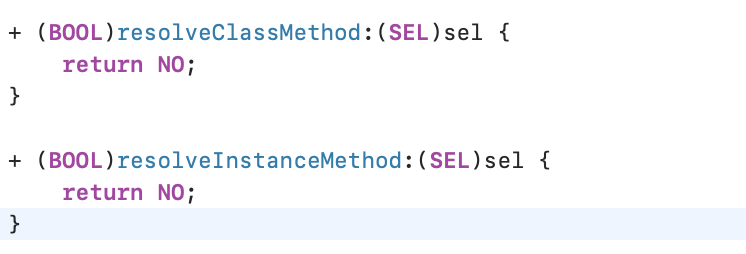
返回YES说明你已经对方法动态解析做了处理,如果返回NO说明要继续到下层处理。
+ (BOOL)resolveInstanceMethod:(SEL)sel {
//系统会自动发送消息 来到这里
NSLog(@"来了 老弟 - %@",self);
if (sel == @selector(run)) {
// 我们动态解析我们的 对象方法
// NSLog(@"对象方法 run 解析走这里");
SEL runSEL = @selector(run);
Method runM= class_getInstanceMethod(self, runSEL);
IMP runImp = method_getImplementation(runM);
const char *type = method_getTypeEncoding(runM);
return class_addMethod(self, sel, runImp, type); 这里只是返回了一个添加成功,但是并没有返回imp,原因是系统会通过sel再找一次imp
}
return [super resolveInstanceMethod:sel];
}
动态解析方法的实质 通过 sel 查找 imp,系统在崩溃之前会查找下resolveInstanceMethod方法,你有没有处理给没有imp的sel添加imp,如果你添加处理了,系统会再次重新查找imp方法,程序正常执行。
下面是类方法动态解析:
发现一个问题,在调用类的类方法,在分类里面实现同名实例方法,程序不会崩溃(并且不会走类方法动态解析)。
类方法 -> 首先递归找自己 -> 然后找父类 (如果没找到走动态解析)
对象方法的存储在类
类方法的存储在元类
类方法首先查找元类里面的对象方法
验证了类方法和原类实例方法是同一个方法(地址相同):
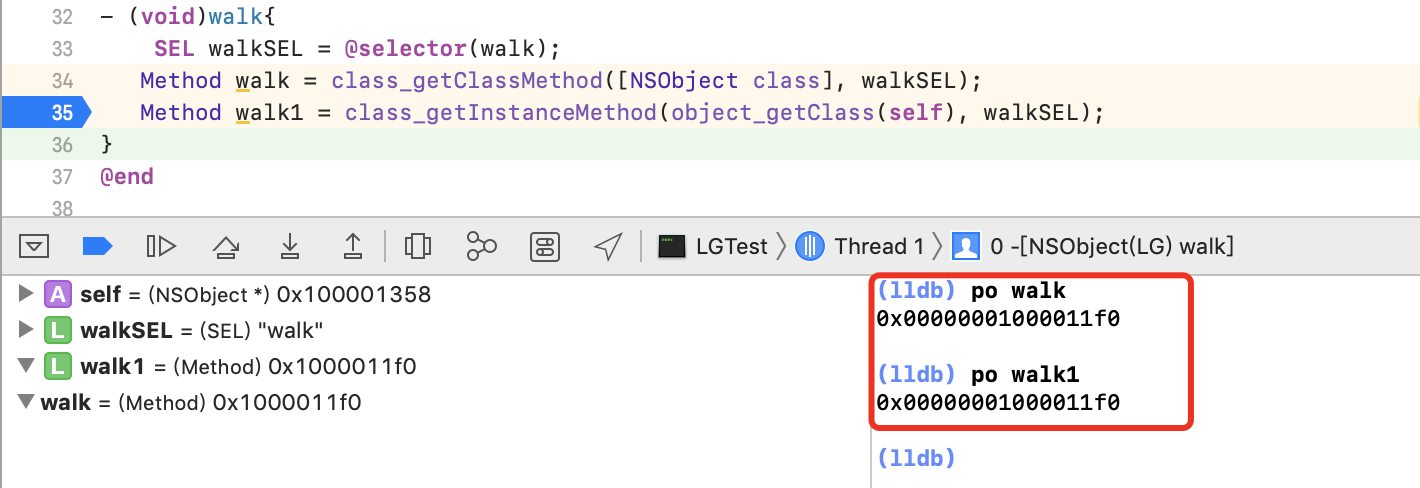
源码:发现类方法其实里面重新调用了从元类里面去实例方法(与之前预测相符)

单步调试分类里面实现与类方法同名的单例方法程序不崩溃原因:
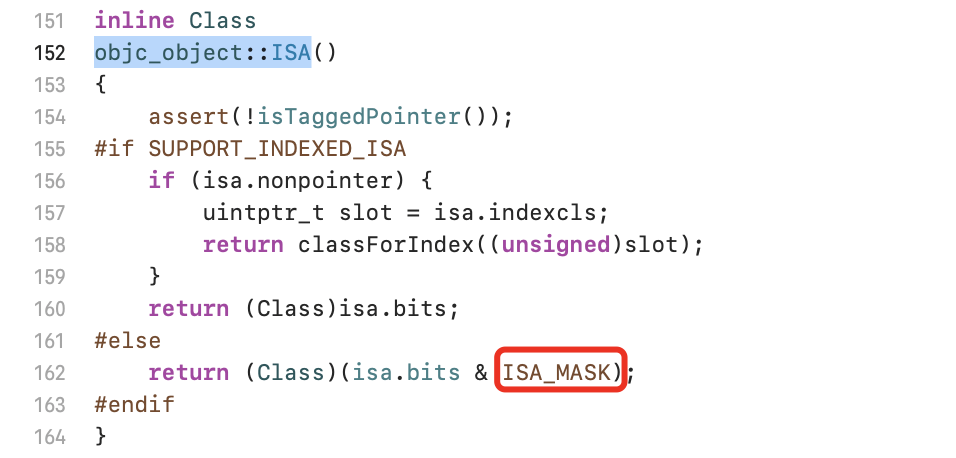
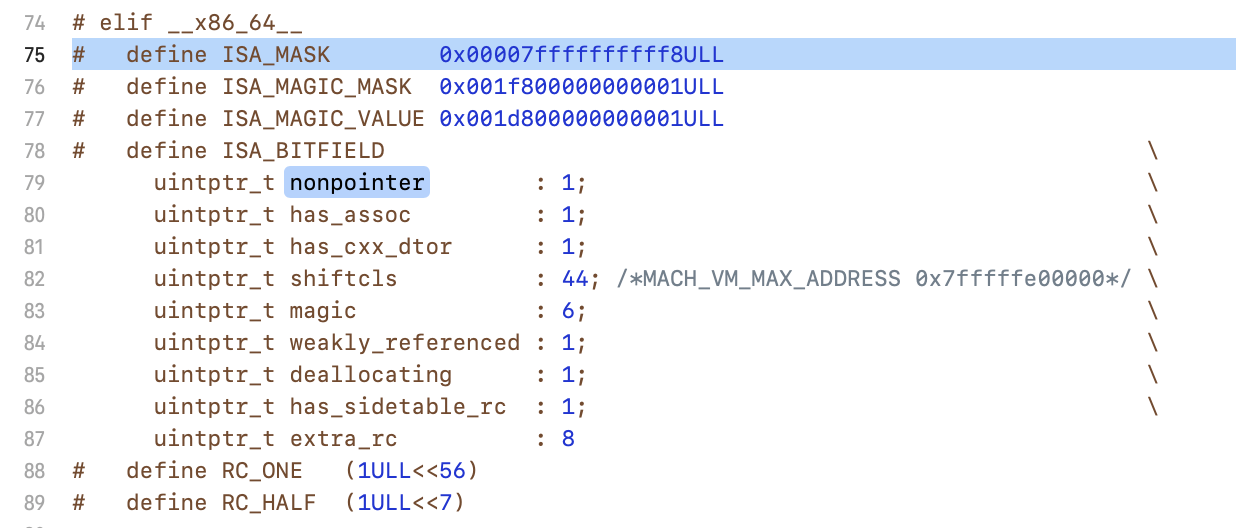
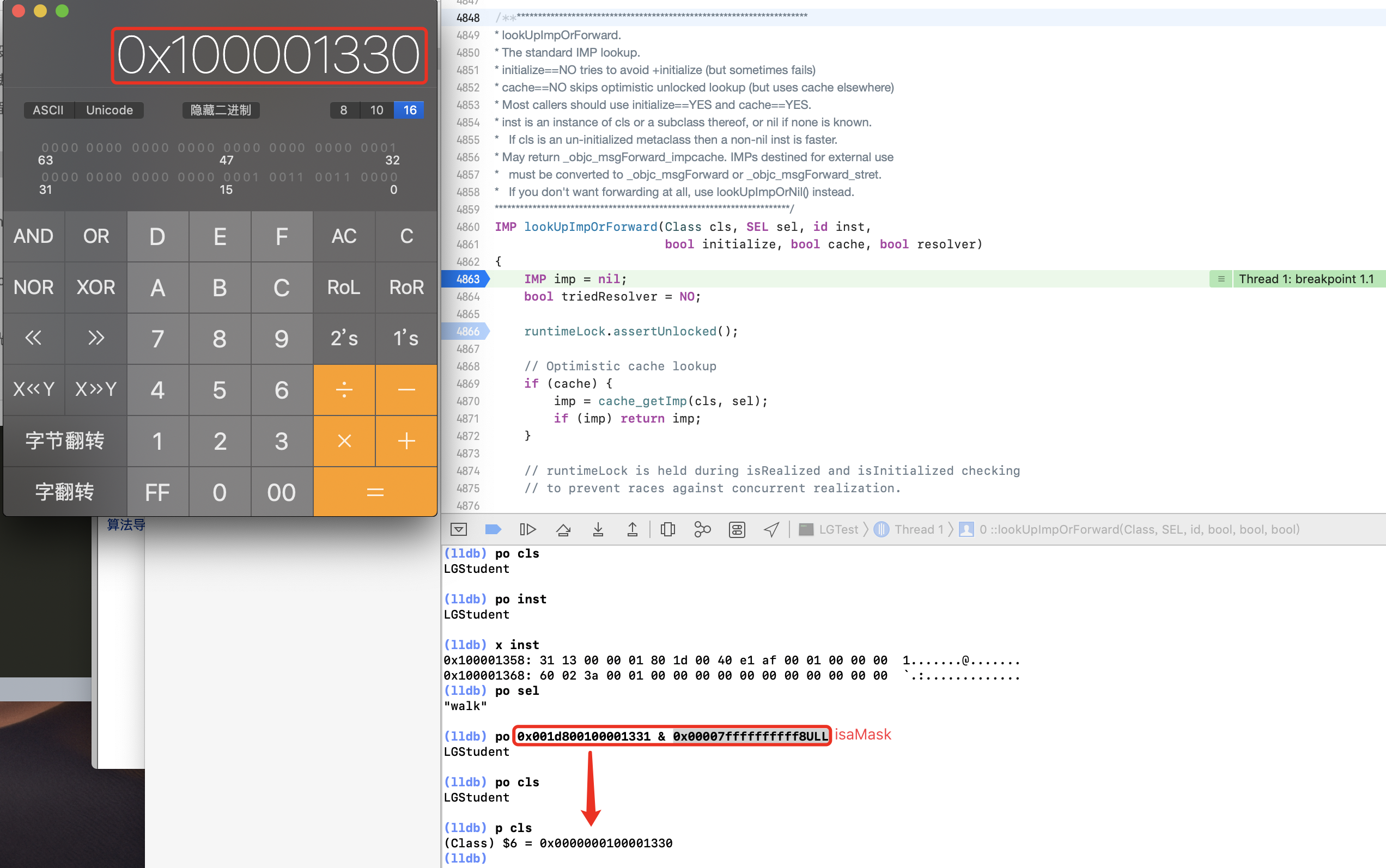
在查找walk类方法过程中,会查找元类->根元类->NSObject,直到NSObject类是否有walk实例方法,因为NSObject的类有分类walk实例方法所以不会崩溃。和对象方法查找有一点不一样。

类方法可以在NSObject里面以类方法和对象方法实现,但是最好是以类方法实现,以类方法实现的话会少找一层。
因为根类NSObject的类方法是存储在根元类里面,所以在找到根元类的时候就找到了方法,不会再去NSObject的类方法列表里去查找
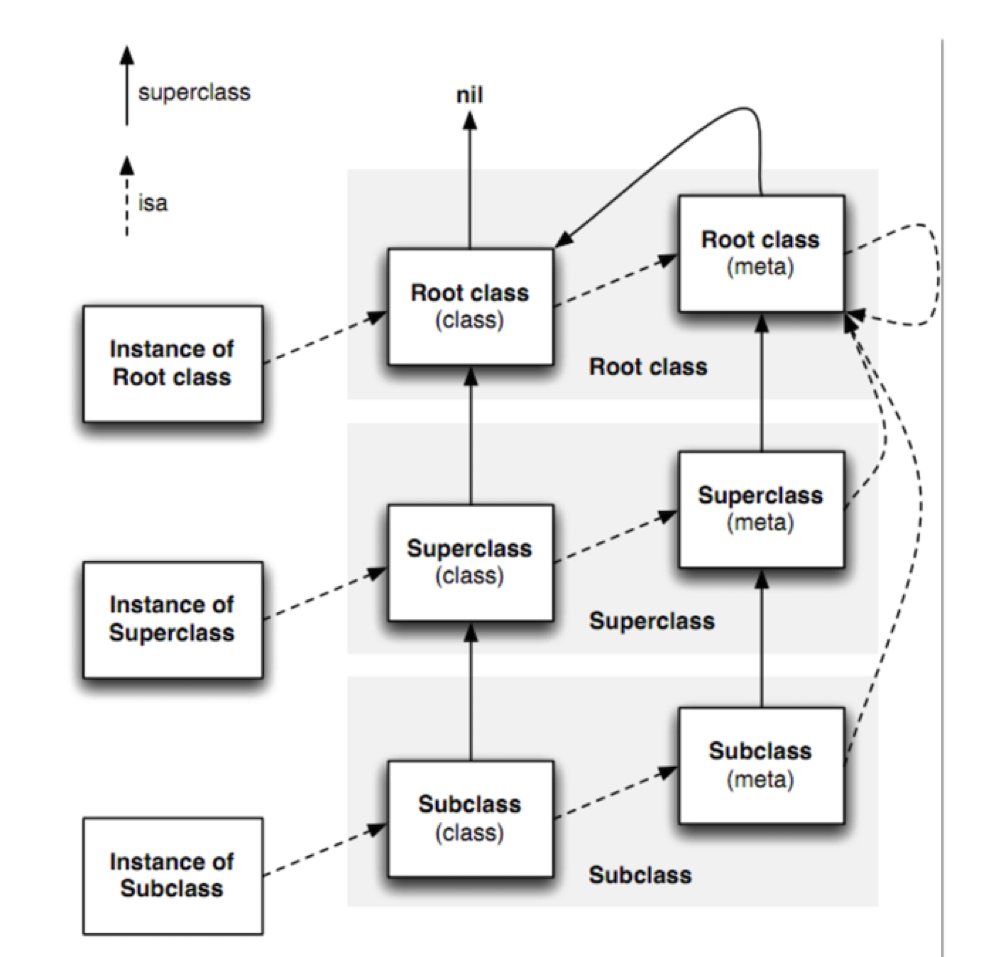
如果NSObject里面也没有实现walk,就会走动态解析了:
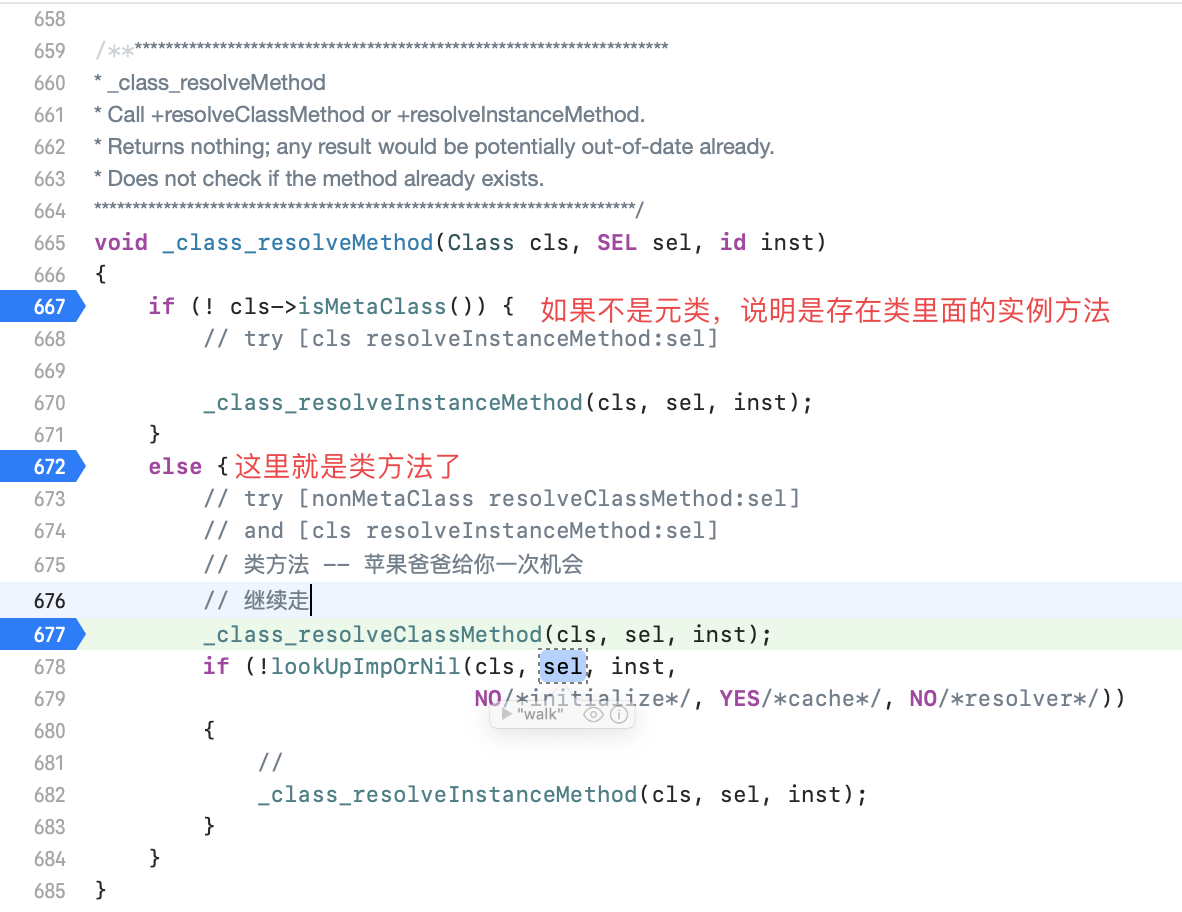
/***********************************************************************
* _class_resolveClassMethod
* Call +resolveClassMethod, looking for a method to be added to class cls.
* cls should be a metaclass.
* Does not check if the method already exists.
**********************************************************************/
static void _class_resolveClassMethod(Class cls, SEL sel, id inst)
{
assert(cls->isMetaClass());
这里和对象方法动态解析类似,不再赘述
if (! lookUpImpOrNil(cls, SEL_resolveClassMethod, inst,
NO/*initialize*/, YES/*cache*/, NO/*resolver*/))
{
// Resolver not implemented.
return;
}
这里和对象方法动态解析有点不一样,就是这里是给yuan'lei
BOOL (*msg)(Class, SEL, SEL) = (typeof(msg))objc_msgSend;
bool resolved = msg(_class_getNonMetaClass(cls, inst),
SEL_resolveClassMethod, sel);
// Cache the result (good or bad) so the resolver doesn't fire next time.
// +resolveClassMethod adds to self->ISA() a.k.a. cls
IMP imp = lookUpImpOrNil(cls, sel, inst,
NO/*initialize*/, YES/*cache*/, NO/*resolver*/);
if (resolved && PrintResolving) {
if (imp) {
_objc_inform("RESOLVE: method %c[%s %s] "
"dynamically resolved to %p",
cls->isMetaClass() ? '+' : '-',
cls->nameForLo
/***********************************************************************
* getNonMetaClass
* Return the ordinary class for this class or metaclass.
* `inst` is an instance of `cls` or a subclass thereof, or nil.
* Non-nil inst is faster.
* Used by +initialize.
* Locking: runtimeLock must be read- or write-locked by the caller
**********************************************************************/
static Class getNonMetaClass(Class metacls, id inst) 个人理解这个方法名称是过滤掉元类
{
static int total, named, secondary, sharedcache;
runtimeLock.assertLocked();
realizeClass(metacls);
total++;
// metacls 元类
// metacls 类对象
// NSObject
// return cls itself if it's already a non-meta class
if (!metacls->isMetaClass()) return metacls;
// metacls really is a metaclass
// special case for root metaclass
// where inst == inst->ISA() == metacls is possible
// 元类的isa = 元类 === 根元类
if (metacls->ISA() == metacls) {
Class cls = metacls->superclass;
assert(cls->isRealized());
assert(!cls->isMetaClass());
assert(cls->ISA() == metacls);
if (cls->ISA() == metacls) return cls;
}
// 类对象
// use inst if available
if (inst) {
Class cls = (Class)inst;
realizeClass(cls);
// cls may be a subclass - find the real class for metacls
// 元类 != 元类
while (cls && cls->ISA() != metacls) {
cls = cls->superclass;
realizeClass(cls);
}
// 类对象,这里有一点出乎意料的是,按照正常理解,实例方法的动态解析应该是放到类方法里面,类方法的动态解析也返回cls到类里面去,思考可能原因是开发人员没法吧类方法的动态解析放到原类里面,所以都放到了类方法里。
if (cls) {
assert(!cls->isMetaClass());
assert(cls->ISA() == metacls);
return cls;
}
gging(), sel_getName(sel), imp);
}
else {
// Method resolver didn't add anything?
_objc_inform("RESOLVE: +[%s resolveClassMethod:%s] returned YES"
", but no new implementation of %c[%s %s] was found",
cls->nameForLogging(), sel_getName(sel),
cls->isMetaClass() ? '+' : '-',
cls->nameForLogging(), sel_getName(sel));
}
}
}
所以不管是类方法动态解析,还是实例方法动态解析,都放到本类里面去处理。(苹果设计)
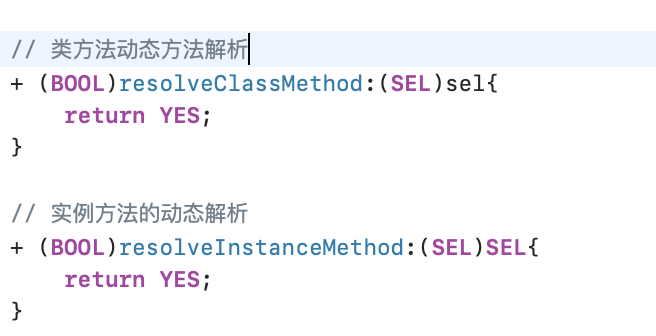
/***********************************************************************
* _class_resolveMethod
* Call +resolveClassMethod or +resolveInstanceMethod.
* Returns nothing; any result would be potentially out-of-date already.
* Does not check if the method already exists.
**********************************************************************/
void _class_resolveMethod(Class cls, SEL sel, id inst)
{
if (! cls->isMetaClass()) {
// try [cls resolveInstanceMethod:sel]
_class_resolveInstanceMethod(cls, sel, inst);
}
else {
// try [nonMetaClass resolveClassMethod:sel]
// and [cls resolveInstanceMethod:sel]
// 类方法 -- 苹果爸爸给你一次机会
// 继续走
_class_resolveClassMethod(cls, sel, inst);
if (!lookUpImpOrNil(cls, sel, inst,
NO/*initialize*/, YES/*cache*/, NO/*resolver*/))
{
//
_class_resolveInstanceMethod(cls, sel, inst); //这里只会调到NSObject 的_class_resolveInstanceMethod方法,不会调用本类的_class_resolveInstanceMethod方法,因为本类的_class_resolveInstanceMethod方法以实例方法存在元类里面,所以不会调用,直到找到NSObject的_class_resolveInstanceMethod方法,所以不管是对象还是类方法的动态解析都会调用NSObject的_class_resolveInstanceMethod方法。
}
}
}
所以可以在NSObject的分类里面
+ (BOOL)resolveInstanceMethod:(SEL)sel{
这里可以手机crash发送给后台,记录崩溃,或者手动添加imp实现提示用户刷新页面等补救措施。
}
后面进入消息转发流程:分为快速转发和慢速转发
快速转发 :forwardSelector fortarget

进入汇编快速转发:
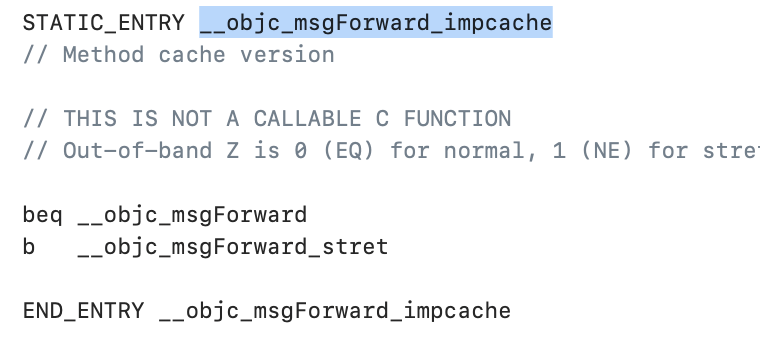
__objc_msgForward 闭源,__objc_msgForward_handler为回调

发现这里调用了CoreFoundation的方法
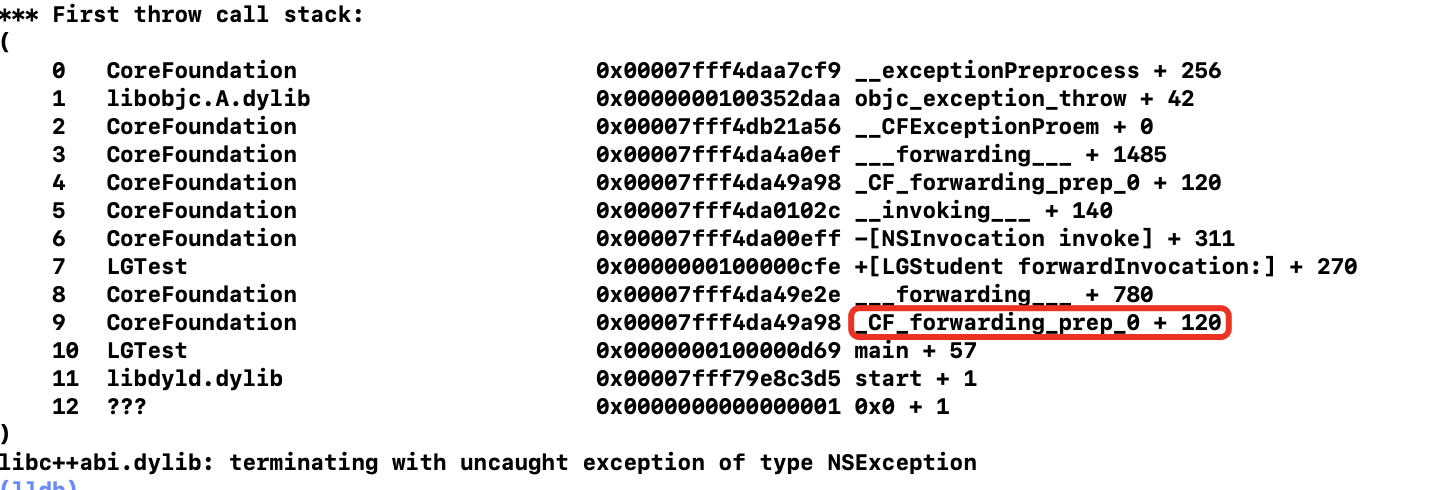
在CoreFoundation里面也没有找到_CF_forwarding_prep_0,闭源。
没关系,可以使用Hopper Disassembler 反汇编,CoreFoundation可执行文件。

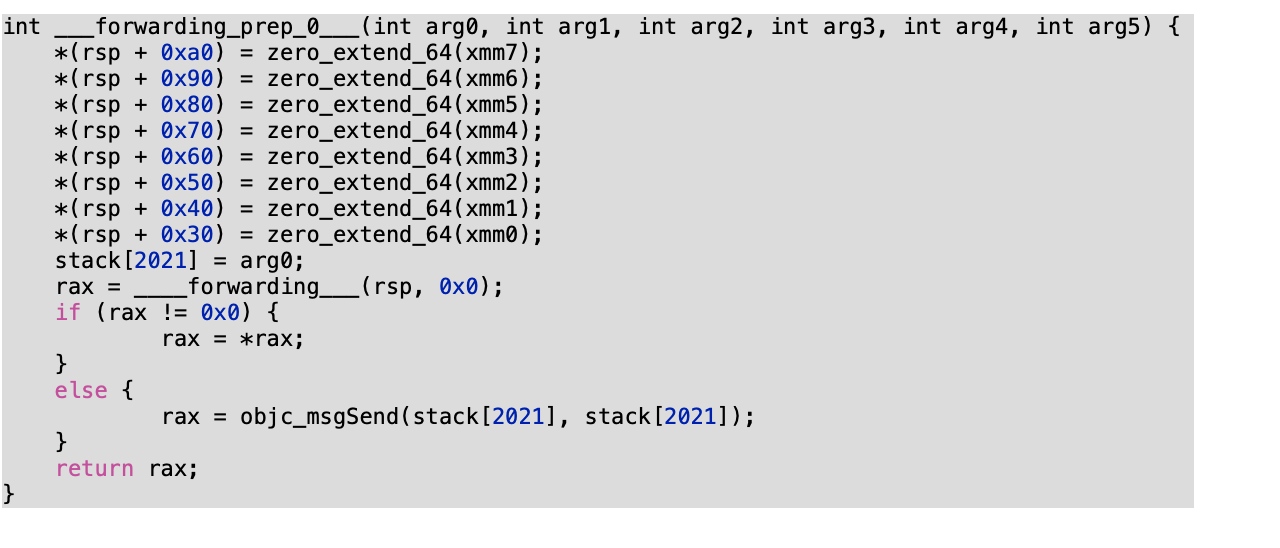
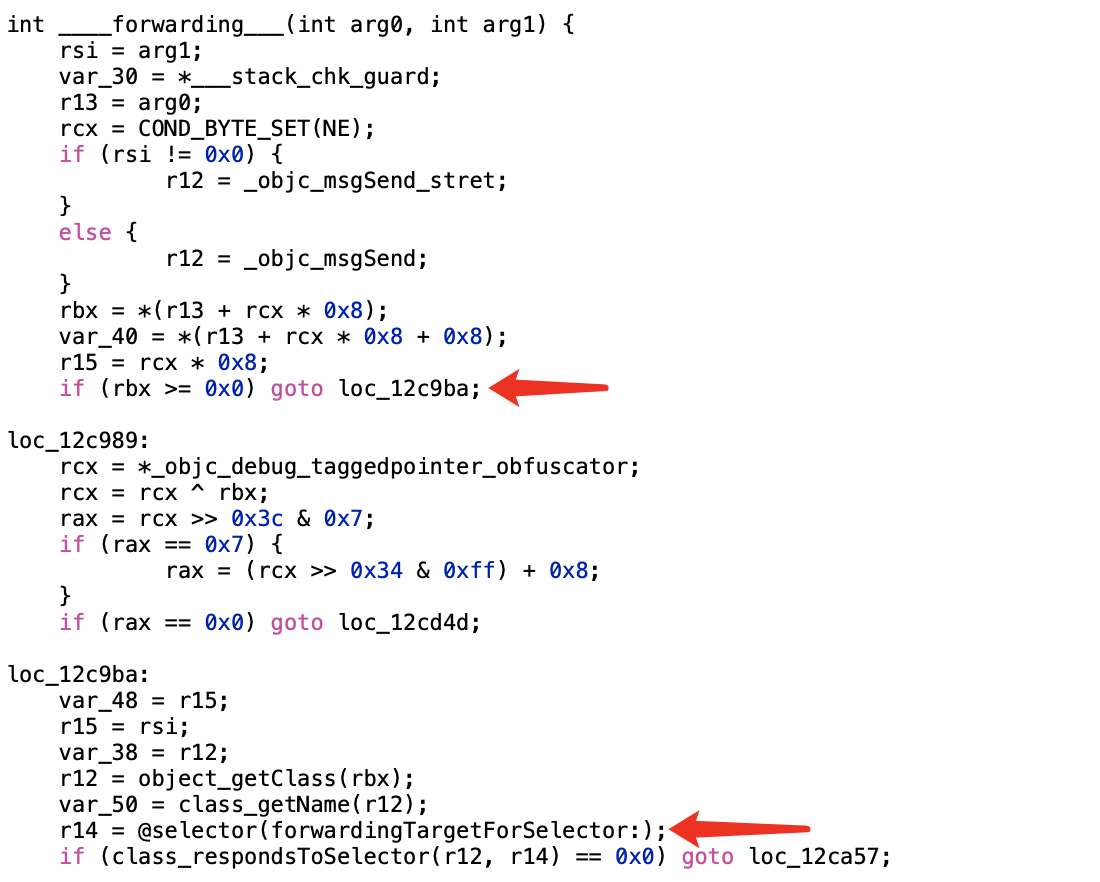
上面这段代码是判断是否响应快速转发,如果不响应快速转发就走慢速转发流程

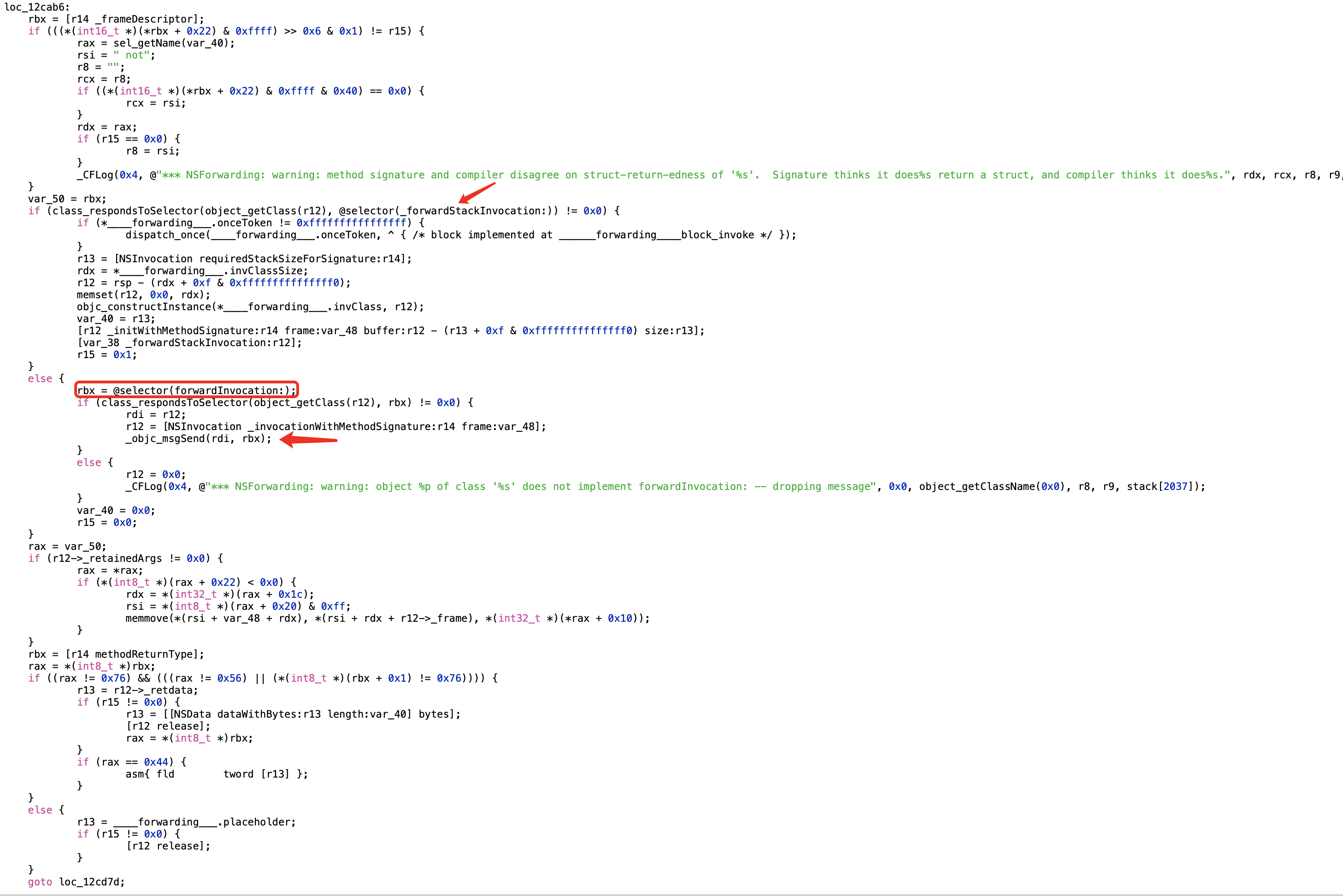
消息转发大致流程是:
发送一个消息 -> 找不到imp - 开发人员没有处理 - 消息快速转发(如果也没有处理就会崩溃,消息发送失败) - 如果说处理了,但是不在这里处理,需要转发交给别人处理
不到最后,万不得已不做重定向
Runloop:

核心方法CFRunLoopRunSpecific
SInt32 CFRunLoopRunSpecific(CFRunLoopRef rl, CFStringRef modeName, CFTimeInterval seconds, Boolean returnAfterSourceHandled) { /* DOES CALLOUT */
CHECK_FOR_FORK();
if (__CFRunLoopIsDeallocating(rl)) return kCFRunLoopRunFinished;
__CFRunLoopLock(rl);
//根据modeName找到本次运行的mode
CFRunLoopModeRef currentMode = __CFRunLoopFindMode(rl, modeName, false);
//如果没找到 || mode中没有注册任何事件,则就此停止,不进入循环
if (NULL == currentMode || __CFRunLoopModeIsEmpty(rl, currentMode, rl->_currentMode)) {
Boolean did = false;
if (currentMode) __CFRunLoopModeUnlock(currentMode);
__CFRunLoopUnlock(rl);
return did ? kCFRunLoopRunHandledSource : kCFRunLoopRunFinished;
}
volatile _per_run_data *previousPerRun = __CFRunLoopPushPerRunData(rl);
//取上一次运行的mode
CFRunLoopModeRef previousMode = rl->_currentMode;
//如果本次mode和上次的mode一致
rl->_currentMode = currentMode;
//初始化一个result为kCFRunLoopRunFinished
int32_t result = kCFRunLoopRunFinished;
if (currentMode->_observerMask & kCFRunLoopEntry ) mode一致就会进入RunLoop 发送通知
/// 1. 通知 Observers: RunLoop 即将进入 loop。
__CFRunLoopDoObservers(rl, currentMode, kCFRunLoopEntry);
result = __CFRunLoopRun(rl, currentMode, seconds, returnAfterSourceHandled, previousMode); 这里是中间的2~9步。
if (currentMode->_observerMask & kCFRunLoopExit )
/// 10. 通知 Observers: RunLoop 即将退出。
__CFRunLoopDoObservers(rl, currentMode, kCFRunLoopExit); mode退出,发送通知
__CFRunLoopModeUnlock(currentMode);
__CFRunLoopPopPerRunData(rl, previousPerRun);
rl->_currentMode = previousMode;
__CFRunLoopUnlock(rl);
return result;
}
下面分析__CFRunLoopRun:
/* rl, rlm are locked on entrance and exit */
/**
* 运行run loop
*
* @param rl 运行的RunLoop对象
* @param rlm 运行的mode
* @param seconds run loop超时时间
* @param stopAfterHandle true:run loop处理完事件就退出 false:一直运行直到超时或者被手动终止
* @param previousMode 上一次运行的mode
*
* @return 返回4种状态
*/
static int32_t __CFRunLoopRun(CFRunLoopRef rl, CFRunLoopModeRef rlm, CFTimeInterval seconds, Boolean stopAfterHandle, CFRunLoopModeRef previousMode) {
//获取系统启动后的CPU运行时间,用于控制超时时间
uint64_t startTSR = mach_absolute_time();
// 判断当前runloop的状态是否关闭
if (__CFRunLoopIsStopped(rl)) {
__CFRunLoopUnsetStopped(rl);
return kCFRunLoopRunStopped;
} else if (rlm->_stopped) {
return kCFRunLoopRunStopped;
rlm->_stopped = false;
}
//mach端口,在内核中,消息在端口之间传递。 初始为0
mach_port_name_t dispatchPort = MACH_PORT_NULL;
//判断是否为主线程
Boolean libdispatchQSafe = pthread_main_np() && ((HANDLE_DISPATCH_ON_BASE_INVOCATION_ONLY && NULL == previousMode) || (!HANDLE_DISPATCH_ON_BASE_INVOCATION_ONLY && 0 == _CFGetTSD(__CFTSDKeyIsInGCDMainQ)));
//如果在主线程 && runloop是主线程的runloop && 该mode是commonMode,则给mach端口赋值为主线程收发消息的端口
if (libdispatchQSafe && (CFRunLoopGetMain() == rl) && CFSetContainsValue(rl->_commonModes, rlm->_name)) dispatchPort = _dispatch_get_main_queue_port_4CF();
#if USE_DISPATCH_SOURCE_FOR_TIMERS
mach_port_name_t modeQueuePort = MACH_PORT_NULL;
if (rlm->_queue) {
//mode赋值为dispatch端口_dispatch_runloop_root_queue_perform_4CF
modeQueuePort = _dispatch_runloop_root_queue_get_port_4CF(rlm->_queue);
if (!modeQueuePort) {
CRASH("Unable to get port for run loop mode queue (%d)", -1);
}
}
#endif
dispatch_source_t timeout_timer = NULL;
struct __timeout_context *timeout_context = (struct __timeout_context *)malloc(sizeof(*timeout_context));
if (seconds <= 0.0) { // instant timeout
seconds = 0.0;
timeout_context->termTSR = 0ULL;
} else if (seconds <= TIMER_INTERVAL_LIMIT) {
//seconds为超时时间,超时时执行__CFRunLoopTimeout函数
dispatch_queue_t queue = dispatch_get_global_queue(DISPATCH_QUEUE_PRIORITY_HIGH, DISPATCH_QUEUE_OVERCOMMIT);
timeout_timer = dispatch_source_create(DISPATCH_SOURCE_TYPE_TIMER, 0, 0, queue);
dispatch_retain(timeout_timer);
timeout_context->ds = timeout_timer;
timeout_context->rl = (CFRunLoopRef)CFRetain(rl);
timeout_context->termTSR = startTSR + __CFTimeIntervalToTSR(seconds);
dispatch_set_context(timeout_timer, timeout_context); // source gets ownership of context
dispatch_source_set_event_handler_f(timeout_timer, __CFRunLoopTimeout);
dispatch_source_set_cancel_handler_f(timeout_timer, __CFRunLoopTimeoutCancel);
uint64_t ns_at = (uint64_t)((__CFTSRToTimeInterval(startTSR) + seconds) * 1000000000ULL);
dispatch_source_set_timer(timeout_timer, dispatch_time(1, ns_at), DISPATCH_TIME_FOREVER, 1000ULL);
dispatch_resume(timeout_timer);
} else { // infinite timeout
//永不超时
seconds = 9999999999.0;
timeout_context->termTSR = UINT64_MAX;
}
//标志位默认为true
Boolean didDispatchPortLastTime = true;
//记录最后runloop状态,用于return
int32_t retVal = 0;
do {
//初始化一个存放内核消息的缓冲池
uint8_t msg_buffer[3 * 1024];
#if DEPLOYMENT_TARGET_MACOSX || DEPLOYMENT_TARGET_EMBEDDED || DEPLOYMENT_TARGET_EMBEDDED_MINI
mach_msg_header_t *msg = NULL;
mach_port_t livePort = MACH_PORT_NULL;
#elif DEPLOYMENT_TARGET_WINDOWS
HANDLE livePort = NULL;
Boolean windowsMessageReceived = false;
#endif
//取所有需要监听的port
__CFPortSet waitSet = rlm->_portSet;
//设置RunLoop为可以被唤醒状态
__CFRunLoopUnsetIgnoreWakeUps(rl);
/// 2. 通知 Observers: RunLoop 即将触发 Timer 回调。
if (rlm->_observerMask & kCFRunLoopBeforeTimers) __CFRunLoopDoObservers(rl, rlm, kCFRunLoopBeforeTimers);
if (rlm->_observerMask & kCFRunLoopBeforeSources)
/// 3. 通知 Observers: RunLoop 即将触发 Source0 (非port) 回调。
__CFRunLoopDoObservers(rl, rlm, kCFRunLoopBeforeSources);
/// 执行被加入的block
__CFRunLoopDoBlocks(rl, rlm);
/// 4. RunLoop 触发 Source0 (非port) 回调。
Boolean sourceHandledThisLoop = __CFRunLoopDoSources0(rl, rlm, stopAfterHandle);
if (sourceHandledThisLoop) {
/// 执行被加入的block
__CFRunLoopDoBlocks(rl, rlm);
}
//如果没有Sources0事件处理 并且 没有超时,poll为false
//如果有Sources0事件处理 或者 超时,poll都为true
Boolean poll = sourceHandledThisLoop || (0ULL == timeout_context->termTSR);
//第一次do..whil循环不会走该分支,因为didDispatchPortLastTime初始化是true
if (MACH_PORT_NULL != dispatchPort && !didDispatchPortLastTime) {
#if DEPLOYMENT_TARGET_MACOSX || DEPLOYMENT_TARGET_EMBEDDED || DEPLOYMENT_TARGET_EMBEDDED_MINI
//从缓冲区读取消息
msg = (mach_msg_header_t *)msg_buffer;
/// 5. 如果有 Source1 (基于port) 处于 ready 状态,直接处理这个 Source1 然后跳转去处理消息。
if (__CFRunLoopServiceMachPort(dispatchPort, &msg, sizeof(msg_buffer), &livePort, 0)) {
//如果接收到了消息的话,前往第9步开始处理msg
goto handle_msg;
}
#elif DEPLOYMENT_TARGET_WINDOWS
if (__CFRunLoopWaitForMultipleObjects(NULL, &dispatchPort, 0, 0, &livePort, NULL)) {
goto handle_msg;
}
#endif
}
didDispatchPortLastTime = false;
/// 6.通知 Observers: RunLoop 的线程即将进入休眠(sleep)。
if (!poll && (rlm->_observerMask & kCFRunLoopBeforeWaiting)) __CFRunLoopDoObservers(rl, rlm, kCFRunLoopBeforeWaiting);
//设置RunLoop为休眠状态
__CFRunLoopSetSleeping(rl);
// do not do any user callouts after this point (after notifying of sleeping)
// Must push the local-to-this-activation ports in on every loop
// iteration, as this mode could be run re-entrantly and we don't
// want these ports to get serviced.
__CFPortSetInsert(dispatchPort, waitSet);
__CFRunLoopModeUnlock(rlm);
__CFRunLoopUnlock(rl);
#if DEPLOYMENT_TARGET_MACOSX || DEPLOYMENT_TARGET_EMBEDDED || DEPLOYMENT_TARGET_EMBEDDED_MINI
#if USE_DISPATCH_SOURCE_FOR_TIMERS
//这里有个内循环,用于接收等待端口的消息
//进入此循环后,线程进入休眠,直到收到新消息才跳出该循环,继续执行run loop
do {
if (kCFUseCollectableAllocator) {
objc_clear_stack(0);
memset(msg_buffer, 0, sizeof(msg_buffer));
}
msg = (mach_msg_header_t *)msg_buffer;
//7.接收waitSet端口的消息
__CFRunLoopServiceMachPort(waitSet, &msg, sizeof(msg_buffer), &livePort, poll ? 0 : TIMEOUT_INFINITY);
//收到消息之后,livePort的值为msg->msgh_local_port,
if (modeQueuePort != MACH_PORT_NULL && livePort == modeQueuePort) {
// Drain the internal queue. If one of the callout blocks sets the timerFired flag, break out and service the timer.
while (_dispatch_runloop_root_queue_perform_4CF(rlm->_queue));
if (rlm->_timerFired) {
// Leave livePort as the queue port, and service timers below
rlm->_timerFired = false;
break;
} else {
if (msg && msg != (mach_msg_header_t *)msg_buffer) free(msg);
}
} else {
// Go ahead and leave the inner loop.
break;
}
} while (1);
#else
if (kCFUseCollectableAllocator) {
objc_clear_stack(0);
memset(msg_buffer, 0, sizeof(msg_buffer));
}
msg = (mach_msg_header_t *)msg_buffer;
/// 7. 调用 mach_msg 等待接受 mach_port 的消息。线程将进入休眠, 直到被下面某一个事件唤醒。
/// • 一个基于 port 的Source 的事件。
/// • 一个 Timer 到时间了
/// • RunLoop 自身的超时时间到了
/// • 被其他什么调用者手动唤醒
__CFRunLoopServiceMachPort(waitSet, &msg, sizeof(msg_buffer), &livePort, poll ? 0 : TIMEOUT_INFINITY);
#endif
#elif DEPLOYMENT_TARGET_WINDOWS
// Here, use the app-supplied message queue mask. They will set this if they are interested in having this run loop receive windows messages.
__CFRunLoopWaitForMultipleObjects(waitSet, NULL, poll ? 0 : TIMEOUT_INFINITY, rlm->_msgQMask, &livePort, &windowsMessageReceived);
#endif
__CFRunLoopLock(rl);
__CFRunLoopModeLock(rlm);
// Must remove the local-to-this-activation ports in on every loop
// iteration, as this mode could be run re-entrantly and we don't
// want these ports to get serviced. Also, we don't want them left
// in there if this function returns.
__CFPortSetRemove(dispatchPort, waitSet);
__CFRunLoopSetIgnoreWakeUps(rl);
// user callouts now OK again
//取消runloop的休眠状态
__CFRunLoopUnsetSleeping(rl);
/// 8. 通知 Observers: RunLoop 的线程刚刚被唤醒了。
if (!poll && (rlm->_observerMask & kCFRunLoopAfterWaiting)) __CFRunLoopDoObservers(rl, rlm, kCFRunLoopAfterWaiting);
/// 收到消息,处理消息。
handle_msg:;
__CFRunLoopSetIgnoreWakeUps(rl);
#if DEPLOYMENT_TARGET_WINDOWS
if (windowsMessageReceived) {
// These Win32 APIs cause a callout, so make sure we're unlocked first and relocked after
__CFRunLoopModeUnlock(rlm);
__CFRunLoopUnlock(rl);
if (rlm->_msgPump) {
rlm->_msgPump();
} else {
MSG msg;
if (PeekMessage(&msg, NULL, 0, 0, PM_REMOVE | PM_NOYIELD)) {
TranslateMessage(&msg);
DispatchMessage(&msg);
}
}
__CFRunLoopLock(rl);
__CFRunLoopModeLock(rlm);
sourceHandledThisLoop = true;
// To prevent starvation of sources other than the message queue, we check again to see if any other sources need to be serviced
// Use 0 for the mask so windows messages are ignored this time. Also use 0 for the timeout, because we're just checking to see if the things are signalled right now -- we will wait on them again later.
// NOTE: Ignore the dispatch source (it's not in the wait set anymore) and also don't run the observers here since we are polling.
__CFRunLoopSetSleeping(rl);
__CFRunLoopModeUnlock(rlm);
__CFRunLoopUnlock(rl);
__CFRunLoopWaitForMultipleObjects(waitSet, NULL, 0, 0, &livePort, NULL);
__CFRunLoopLock(rl);
__CFRunLoopModeLock(rlm);
__CFRunLoopUnsetSleeping(rl);
// If we have a new live port then it will be handled below as normal
}
#endif
if (MACH_PORT_NULL == livePort) {
CFRUNLOOP_WAKEUP_FOR_NOTHING();
// handle nothing
} else if (livePort == rl->_wakeUpPort) {
CFRUNLOOP_WAKEUP_FOR_WAKEUP();
// do nothing on Mac OS
#if DEPLOYMENT_TARGET_WINDOWS
// Always reset the wake up port, or risk spinning forever
ResetEvent(rl->_wakeUpPort);
#endif
}
#if USE_DISPATCH_SOURCE_FOR_TIMERS
else if (modeQueuePort != MACH_PORT_NULL && livePort == modeQueuePort) {
CFRUNLOOP_WAKEUP_FOR_TIMER();
/// 9.1 如果一个 Timer 到时间了,触发这个Timer的回调。
if (!__CFRunLoopDoTimers(rl, rlm, mach_absolute_time())) {
// Re-arm the next timer, because we apparently fired early
__CFArmNextTimerInMode(rlm, rl);
}
}
#endif
#if USE_MK_TIMER_TOO
else if (rlm->_timerPort != MACH_PORT_NULL && livePort == rlm->_timerPort) {
CFRUNLOOP_WAKEUP_FOR_TIMER();
// On Windows, we have observed an issue where the timer port is set before the time which we requested it to be set. For example, we set the fire time to be TSR 167646765860, but it is actually observed firing at TSR 167646764145, which is 1715 ticks early. The result is that, when __CFRunLoopDoTimers checks to see if any of the run loop timers should be firing, it appears to be 'too early' for the next timer, and no timers are handled.
// In this case, the timer port has been automatically reset (since it was returned from MsgWaitForMultipleObjectsEx), and if we do not re-arm it, then no timers will ever be serviced again unless something adjusts the timer list (e.g. adding or removing timers). The fix for the issue is to reset the timer here if CFRunLoopDoTimers did not handle a timer itself. 9308754
if (!__CFRunLoopDoTimers(rl, rlm, mach_absolute_time())) {
// Re-arm the next timer
__CFArmNextTimerInMode(rlm, rl);
}
}
#endif
/// 9.2 如果有dispatch到main_queue的block,执行block
else if (livePort == dispatchPort) {
CFRUNLOOP_WAKEUP_FOR_DISPATCH();
__CFRunLoopModeUnlock(rlm);
__CFRunLoopUnlock(rl);
_CFSetTSD(__CFTSDKeyIsInGCDMainQ, (void *)6, NULL);
#if DEPLOYMENT_TARGET_WINDOWS
void *msg = 0;
#endif
__CFRUNLOOP_IS_SERVICING_THE_MAIN_DISPATCH_QUEUE__(msg);
_CFSetTSD(__CFTSDKeyIsInGCDMainQ, (void *)0, NULL);
__CFRunLoopLock(rl);
__CFRunLoopModeLock(rlm);
sourceHandledThisLoop = true;
didDispatchPortLastTime = true;
} else {
/// 9.3 如果一个 Source1 (基于port) 发出事件了,处理这个事件
CFRUNLOOP_WAKEUP_FOR_SOURCE();
// Despite the name, this works for windows handles as well
CFRunLoopSourceRef rls = __CFRunLoopModeFindSourceForMachPort(rl, rlm, livePort);
if (rls) {
#if DEPLOYMENT_TARGET_MACOSX || DEPLOYMENT_TARGET_EMBEDDED || DEPLOYMENT_TARGET_EMBEDDED_MINI
mach_msg_header_t *reply = NULL;
sourceHandledThisLoop = __CFRunLoopDoSource1(rl, rlm, rls, msg, msg->msgh_size, &reply) || sourceHandledThisLoop;
if (NULL != reply) {
(void)mach_msg(reply, MACH_SEND_MSG, reply->msgh_size, 0, MACH_PORT_NULL, 0, MACH_PORT_NULL);
CFAllocatorDeallocate(kCFAllocatorSystemDefault, reply);
}
#elif DEPLOYMENT_TARGET_WINDOWS
sourceHandledThisLoop = __CFRunLoopDoSource1(rl, rlm, rls) || sourceHandledThisLoop;
#endif
}
}
#if DEPLOYMENT_TARGET_MACOSX || DEPLOYMENT_TARGET_EMBEDDED || DEPLOYMENT_TARGET_EMBEDDED_MINI
if (msg && msg != (mach_msg_header_t *)msg_buffer) free(msg);
#endif
/// 执行加入到Loop的block
__CFRunLoopDoBlocks(rl, rlm);
if (sourceHandledThisLoop && stopAfterHandle) {
/// 进入loop时参数说处理完事件就返回。
retVal = kCFRunLoopRunHandledSource;
} else if (timeout_context->termTSR < mach_absolute_time()) {
/// 超出传入参数标记的超时时间了
retVal = kCFRunLoopRunTimedOut;
} else if (__CFRunLoopIsStopped(rl)) {
/// 被外部调用者强制停止了
__CFRunLoopUnsetStopped(rl);
retVal = kCFRunLoopRunStopped;
} else if (rlm->_stopped) {
/// 自动停止了
rlm->_stopped = false;
retVal = kCFRunLoopRunStopped;
} else if (__CFRunLoopModeIsEmpty(rl, rlm, previousMode)) {
/// source/timer/observer一个都没有了
retVal = kCFRunLoopRunFinished;
}
/// 如果没超时,mode里没空,loop也没被停止,那继续loop。
} while (0 == retVal);
if (timeout_timer) {
dispatch_source_cancel(timeout_timer);
dispatch_release(timeout_timer);
} else {
free(timeout_context);
}
return retVal;
}
